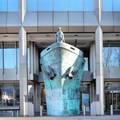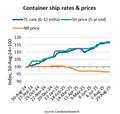Arctic Diesel & Equiptment
Arctic Diesel & Equipment Company appears to be a specialized entity focused on providing diesel fuel and equipment solutions suited for extreme cold environments, particularly in Arctic regions. Companies like this are critical in areas where extreme weather conditions pose significant challenges to equipment operation and fuel performance.
Key Aspects:
Specialized Fuels: They likely offer Arctic diesel, a type of fuel formulated to perform in extremely cold temperatures. Regular diesel can thicken and potentially gel in frigid conditions, causing operational issues for diesel engines. Arctic diesel would have additives to lower its pour point and prevent gelling.
Equipment Solutions: The company may provide equipment designed or modified to operate efficiently in low-temperature environments. This could include heavy machinery, generators, and other industrial equipment, often with special cold-weather modifications like engine block heaters, battery warmers, and special lubricants.
Client Base: Target customers would likely include industries operating in Arctic or sub-Arctic regions, such as mining, oil and gas exploration, forestry, and remote infrastructure development. Government agencies and research stations in polar areas could also be key clients.
Services and Support: They might offer additional services such as equipment leasing, maintenance and repair, field support, and logistical solutions tailored to the unique challenges of cold-weather operations.
Innovation and Reliability: Success in such a niche market would depend heavily on continuous innovation and a strong track record for reliability, ensuring that their products perform well even in harsh conditions.
Benefits:
Reliability: Specialized fuel and equipment reduce the risk of downtime due to fuel gelling or equipment failure, which can be critical in remote and harsh environments.
Efficiency: Improved performance and efficiency in low temperatures can lead to cost savings and more consistent operations.
Safety: Proper equipment suited for Arctic conditions enhances safety for operators and workers, reducing the risks associated with equipment failure in extreme cold.
Challenges:
Logistics: Delivering products and services to remote and often inaccessible Arctic locations poses significant logistical challenges.
Environmental Regulations: Operating in fragile Arctic ecosystems requires strict adherence to environmental regulations and best practices.
Innovation Needs: Continual investment in R&D is necessary to keep up with the evolving demands and conditions of Arctic environments.
Conclusion:
Arctic Diesel & Equipment Company plays a crucial role in enabling industries to operate in some of the most challenging environments on earth. By providing specially formulated fuels and robust equipment, they help ensure the continuity and safety of operations in extremely cold conditions.
- 907 229-5678
- [email protected]
Anchorage USA
Anchorage AK 99507
USA
Ships
HT 02
Barge | Flag: Federative Republic of Brazil | Port: Manaus
Maritime News

Shipbuilding - JV Company Orders Containership Pair

Trump Administration Drops Gauntlet on UN Fuel Rules, Threatens Tariffs

Second-hand Containership Prices Soar in the Face of Soft Shipping Rates

“2 Days, 50 Ports”: New Wave Media Acquires Port of the Future Conference & Exhibition
